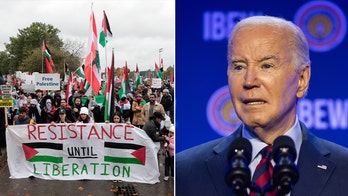
The federal government this week announced a new round of funding -- nearly $120 million -- for programs across the country that promote marriage or fatherhood, an initiative that began under President Bush and has now been continued by President Obama. (AP)
The federal government this week announced a new round of funding -- nearly $120 million -- for programs across the country that promote marriage or fatherhood, an initiative that began under President Bush and has now been continued by President Obama.
The Administration for Children and Families, (ACF), which is part of the Department of Health and Human Services, announced Monday that it was awarding $119.4 million in grants to 120 organizations -- $59.9 million for 60 marriage programs and $59.3 million for 60 fatherhood programs.
Among the recipients are religious organizations, state departments of family services and nonprofit groups. The maximum grant was $2.5 million, which several organizations received, and the lowest was $338,000 for Youth and Family Services in El Reno,Okla.
"A strong and stable family is the greatest advantage any child can have," George Sheldon, HHS acting assistant secretary for children and families, said in a press release. "These grants support programs that promote responsible parenting, encourage healthy relationships and marriage, and help families move toward self-sufficiency and economic stability."
The $119 million is part of a $150-million fund Congress authorized after the initial five-year grants expired at the end of last month. The rest of the money will be used for research, training and administrative costs. Unlike the five-year grants, Congress will have to reauthorize these grants next year -- a dicey proposition given the lack of political appetite for federal spending.
The programs have garnered support on both ends of the political spectrum -- some conservatives support the marriage initiative while some liberals favor the fatherhood programs -- but critics are still skeptical about their effectiveness and question whether they're worth the cost.
"I think there are some things government does well. This is not one of them," said Shawn Fremstard, a senior research associate with the Center for Economic and Policy Research. "The problem with both is they're very soft in terms of what they try to do. It's mostly subsidizing very general services that don't have much of a connection to the labor market."
Robert Rector, a senior research fellow at the conservative Heritage Foundation who focuses on welfare and poverty, said he strongly supports the marriage initiative because in his view, the decline of marriage is the primary cause of child poverty.
He noted that 70 percent of families living in poverty are led by single mothers and that the $60 million spent on those programs pale in comparison to the $350 billion that the federal government spends each year on various types of means-tested assistance to low-income families, such as Medicaid, food stamps and tax breaks.
"We're not going to reduce the child poverty rate or that huge welfare expenditure unless we can bring married fathers back into the home," he said.
But Rector called the fatherhood programs a "red herring" that is actually an "old-style jobs training program that doesn't do anything."
"You can't be an effective father if you're not in the home and you're not going to stay in the home if you're not married," he said.
But others believe that view is short-sighted.
"Marriage is a great institution but it can't be counted on as the sole solution to pull someone out of poverty or ensure a path to the middle class," said Alan Barber, a spokesman for the Center for Economic and Policy Research.
Fremstard said the marriage program is a good example of conservatives happy to support the government when it does things that they like, such as promoting marriage.
"They forget the critique of the effectiveness of government," he said. "What you're effectively doing is funding classes for 22-year-olds with social workers. I think that's very limited. Everything we know from evaluations is it doesn't do much."
But Greg Schutte, director of Marriage Works! Ohio, which received a $2.5 million grant, said studies show that marriages saved from divorce save taxpayers $112 billion per year -- money that would otherwise be spent to support single-parent households.
Schutte his own personal experience leading the program has been "phenomenal."
"You have good, you have bad. But what we have seen is lives changed," he said, explaining that the program teaches couples budgeting, productive conflict resolution, coping with personality differences and communication through life changes.
Roland Warren, president of the National Fatherhood Initiative, which is the leading provider of curriculum for the fatherhood programs, touted their success.
"To the degree that organizations are using evidence-based programs, it's a very positive thing when more resources are there," he said, noting that one successful program for prisoners helps them develop the skills they need to be good fathers. "These are the kinds of programs that organizations should be using that the funding they receive has the impact that the government would want it to have."
Warren said 24 million children are growing up in "father-absent homes" who are more at risk for a range of problems, such as teen pregnancy, drug use and dropping out of high school. But the fathers need help too, he said, citing a survey he conducted that showed half of the respondents said they weren't prepared to be a father when their child was born. More than half said they were replaceable by another man or their child's mother.
"If you don't have the skills, it's easy to believe you're replaceable," he said.
Warren agrees that marriage is an important factor in raising healthy families but isn't the only one.
"You have to meet people where they are," he said, explaining that some fathers have children with different women. "The reality is he needs to take care of those children."
He added, "You're not going to get that guy to the marriage program because he's not married. But you can get him to a fatherhood program. It's a false dichotomy. You can't create the world you want. You have to look at the world as it is."




